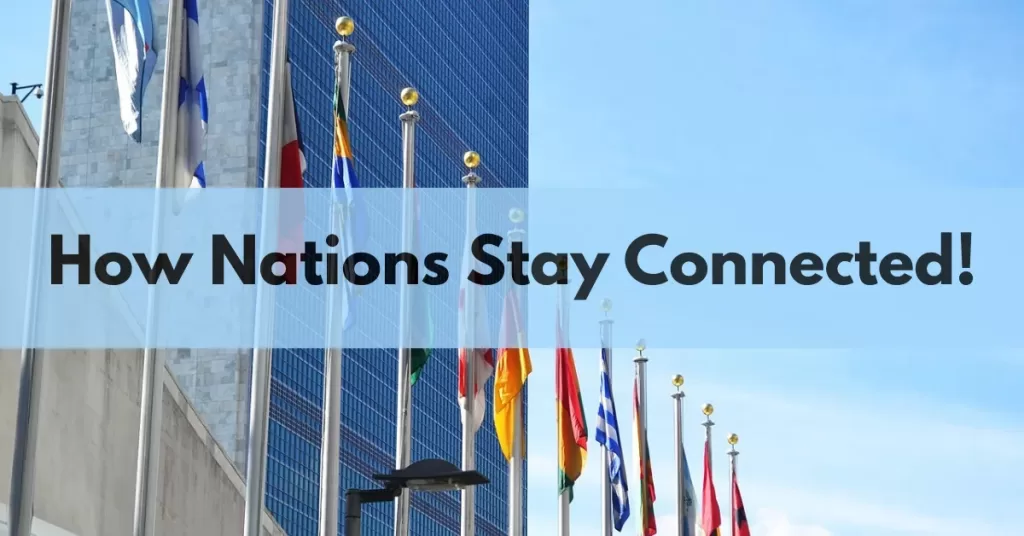Why Should You Care About International Relations?
Imagine waking up one morning to find that all international flights have been canceled, foreign trade has stopped, and diplomatic ties between nations no longer exist. The smartphone you use, the clothes you wear, and even the food you eat—all these things are made possible by international cooperation. International relations (IR) shape our daily lives in more ways than we realize.
As a student of political science, you might wonder: Why should I study international relations? How does it impact me? or what is the importance of international relations? The answer is simple—whether it’s economic growth, global peace, climate change, or even technological advancements, the role of international relations is undeniable.
In this article, we will explore the importance of international relations in today’s world and how it influences our societies, economies, and political structures.
Must Read- Theories of International Relations: A Beginner’s Guide
10 Importance of International Relations
1. Promoting Global Peace and Security
One of the primary goals of international relations is to maintain peace and security among nations. Organizations like the United Nations (UN) and treaties like the Nuclear Non-Proliferation Treaty (NPT) help prevent conflicts and promote diplomatic solutions.
- Through diplomatic negotiations, countries can resolve disputes without resorting to war.
- Peacekeeping missions help stabilize war-torn regions.
- Treaties and agreements ensure that weapons of mass destruction do not pose a threat to humanity.
Without international relations, conflicts would escalate, and global stability would be at risk.
2. Boosting Economic Growth and Trade
International relations facilitate global trade and economic interdependence. Organizations like the World Trade Organization (WTO), International Monetary Fund (IMF), and World Bank play a crucial role in ensuring smooth trade relations.
- Foreign investments help nations develop industries and infrastructure.
- Trade agreements like NAFTA, the European Union (EU), and ASEAN promote economic cooperation.
- Globalization has led to an interconnected world economy, making it easier for businesses to expand internationally.
A strong international trade network allows countries to prosper economically, leading to job creation and improved living standards.
3. Addressing Global Challenges: Climate Change, Pandemics, and Human Rights
Many of the world’s biggest problems require international cooperation. Without collaboration, no single nation can solve crises like climate change, pandemics, or human rights violations.
- Climate change agreements, such as the Paris Agreement, bring countries together to reduce carbon emissions.
- Global health initiatives, like those led by the World Health Organization (WHO), helped combat COVID-19 and other pandemics.
- Human rights organizations, such as Amnesty International and the United Nations Human Rights Council, work to protect individuals from persecution and discrimination.
These challenges affect all of us, making international cooperation vital.
4. Encouraging Cultural Exchange and Understanding
Have you ever watched a foreign movie, eaten international cuisine, or studied a language that isn’t your native tongue? This is the result of international relations fostering cultural exchange.
- Student exchange programs allow young minds to experience different cultures firsthand.
- Tourism helps people understand different traditions and perspectives.
- Social media and technology connect people from different parts of the world, breaking cultural barriers.
Cultural exchange promotes tolerance and reduces stereotypes, making the world a more inclusive place.
5. Enhancing Technological and Scientific Advancements
International relations facilitate technological progress through global collaboration in science and innovation.
- Space exploration efforts, such as the International Space Station (ISS), involve multiple countries working together.
- Medical advancements, such as vaccine research, require international cooperation.
- Artificial intelligence (AI) and cybersecurity efforts are increasingly becoming global concerns.
By sharing knowledge and resources, nations can advance faster in science and technology.
6. Shaping Global Governance and International Law
International laws and organizations play a crucial role in regulating how nations interact with one another.
- The United Nations (UN) creates frameworks for conflict resolution.
- The International Criminal Court (ICC) holds war criminals accountable.
- Agreements like the Law of the Sea Treaty regulate maritime activities.
These institutions ensure that international norms are followed, preventing anarchy in global politics.
7. Strengthening Diplomatic Relations and Alliances
Through diplomacy, nations build strong alliances that foster cooperation rather than conflict.
- Bilateral and multilateral agreements help countries collaborate on shared interests.
- Strategic alliances, such as NATO, ensure collective security.
- Ambassadors and consulates help maintain smooth diplomatic interactions.
Strong diplomatic relations prevent misunderstandings and reinforce global stability.
8. Improving Humanitarian Assistance and Disaster Relief
International relations play a crucial role in responding to natural disasters and humanitarian crises.
- International aid organizations, such as the Red Cross and UNHCR, provide relief to affected regions.
- Emergency response teams from different countries work together in disaster-stricken areas.
- Financial and medical assistance is provided to nations in need.
This ensures that no country has to face a disaster alone.
9. Protecting Global Resources and Environment
Natural resources, such as clean water, forests, and oceans, require international cooperation for sustainable management.
- International environmental agreements, such as the Kyoto Protocol, promote sustainable practices.
- Marine conservation efforts help regulate fishing and prevent ocean pollution.
- Global energy cooperation promotes renewable energy use and reduces dependence on fossil fuels.
Protecting shared global resources ensures a sustainable future for all.
10. Fostering Education and Knowledge Sharing
Education benefits immensely from international cooperation.
- Scholarship programs, such as Fulbright and Erasmus, allow students to study abroad.
- International research collaborations lead to breakthroughs in science and medicine.
- Global conferences and summits provide platforms for knowledge exchange.
These efforts enhance learning opportunities and promote innovation worldwide.
Conclusion
The importance of international relations cannot be overstated. From promoting peace to driving economic growth, addressing global challenges, and fostering cultural exchange, IR is the backbone of a stable and progressive world.
As a student of political science, understanding international relations helps you grasp how the world operates. The more nations cooperate, the better our chances of tackling global challenges effectively.
So, next time you hear about a diplomatic summit, a new trade agreement, or an international climate pledge, remember—these are the building blocks of a peaceful, prosperous, and interconnected world.
FAQ Section
1. Why is international relations important in today’s world?
It helps maintain peace, boosts economic growth, addresses global issues, and fosters cultural exchange.
2. How does international relations impact individuals?
It influences trade, technology, travel, and even the security of nations, which directly affects daily life
3. What are the key areas of international relations?
Diplomacy, global trade, international law, security, human rights, and environmental policies.
4. Which organizations play a major role in international relations?
The United Nations (UN), World Trade Organization (WTO), International Monetary Fund (IMF), and World Health Organization (WHO).
5. How can students benefit from studying international relations?
It offers career opportunities in diplomacy, government, business, and international organizations.
References
- Baylis, J., Smith, S., & Owens, P. (2020). The Globalization of World Politics: An Introduction to International Relations. Oxford University Press.
- Nye, J. S. (2011). The Future of Power. PublicAffairs.
- Keohane, R. O., & Nye, J. S. (2012). Power and Interdependence. Pearson.
- United Nations. (2023). Peace and Security. Retrieved from https://www.un.org/
- World Trade Organization. (2023). Trade and Development. Retrieved from https://www.wto.org/
- World Health Organization. (2023). Global Health Initiatives. Retrieved from https://www.who.int/

